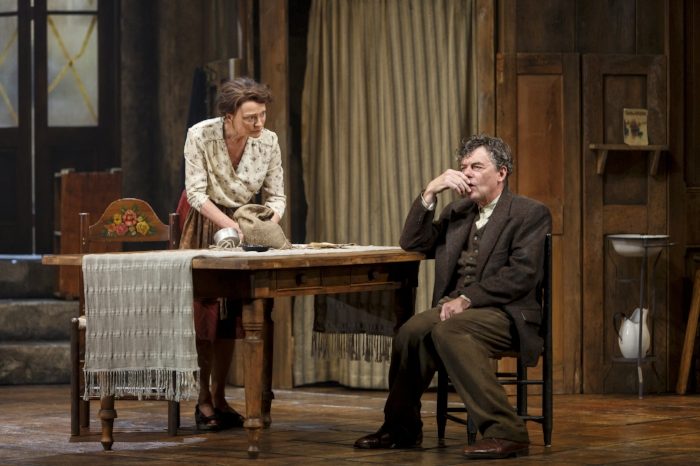There’s a lot happening in Napoli Milionaria! and I found it beneficial to read as much of the Program Background Notes as much as possible prior to curtain.
The Story: We are introduced to the Iovines, a modest but poor family who live in a windowless ground-floor dwelling in 1942, in the Spanish quarter during the Second World War. Patriarch Gennaro (Tom McCamus) has become an object of derision and ridicule among his family and friends and has submitted to the wills and dictates of what others think about him. He only has a marginal influence over his family while one would have thought that European society at the time dictated the male was the ruler of the house.
The matriarch of the house, Amalia (Brigit Wilson), has taken to selling food on the black market to her neighbors. If she can make a bit of profit buying and selling food, even better. While Gennaro disapproves of his wife’s business, he does absolutely nothing to stop her from what she is doing. In the second act, the family’s life has changed; there is freedom and there is money. The family dresses nicely and the home has been remodeled. Amalia still dabbles in the black market, but it appears as if the family and their friends are only interested in themselves and their new-found way of life. The rest of the play involved various family members, friends, and business associates and the influence they have on the lives of the Iovines.
The Production: It has been a long, long time since I’ve seen so much laundry hanging out to dry and I certainly had my fill of it when I entered the Avon Theatre auditorium. Growing up in the 60s, I can remember many people hanging clothes out to dry. Mega amounts of laundry and linen hang on suspended clothes lines which cover the entire stage. When the performance begins, these lines are dropped and actors quickly scoop up the clothes and place them in laundry baskets.
The laundry covered so much of the set, but I could make out faintly the sitting area behind the wash. There is a dining table center stage, stage right a large bed with pillows and stage left, Gennaro and Amalia’s bedroom, I suppose.
Along with the levels of relationships upon relationships within this twenty-two-member cast, there is a great deal of exposition within the dialogue so I had to pay close attention. I found the opening few minutes just a tad slow, but perseverance did win out on my part. It’s rather amusing and comical that these characters simply don’t speak to each other, but shout at each other all the time. (Something within Italian families?) Unfortunately, within these large casts, I’m not always able to mention each individual performer for lack of space and I really wish I could.
Tom McCamus is terrific as emasculated husband Gennaro who always has his opinion about the world and local events even though there are family members who don’t care what he thinks in the first act. It might appear at first Gennaro is one dimensional, but that is not the case at all as Mr. McCamus admirably shows us a very real, very hurting father figure.
I was tremendously impressed with the character development and nuances of Brigit Wilson’s feisty Amalia. Here is a woman who has obviously been hard done by, but she is not one simply to let life slip through her fingers. I’m trying not to spoil the plot again, but in the second and third acts, the Iovines once again experience some trying challenges that threaten to pull them apart. It was marvelous to watch Ms. Wilson’s growth in character development as the matriarch and to hear how she responded to these events sometimes surprisingly and sometimes harshly. The final, silent and still moment captured between Mr. McCamus and Ms. Wilson was quite poignant and moving.
Shruti Kothari and Johnathan Sousa deliver solidly credible performances as brother and sister Maria Rosaria and Amedeo. I found at the end of the play that the circumstances in which Amedeo placed himself did not make me feel any sympathy for him and felt he would deserve what happened to him. I was sincerely and heartfully touched when Mr. Sousa returns and tries to right the wrong that Amedeo has inflicted on his family.
Andre Sills as Brigadiere Ciappa is steadfast in wanting to do the right thing as a representative of the law. Again, I don’t want to spoil the plot, but there are hints that I believe he may have crossed the line in his relationship with this family.
Final Comments: Through all their faults, mistakes and errors, Eduardo De Filippo has written a story of human individuals who have learned to embrace their foibles and weaknesses no matter how awful and terrible in whatever time and place these people find themselves. This production of Napoli Milionaria does appeal to our humanity and, in doing so, this appeal has enabled the playwright “to find an eager audience among all social classes’ as Cimolino writes in his Director’s Notes.
Napoli Milionaria! continues to October 27, 2018, at Stratford’s Avon Theatre, 99 Downie Street, Stratford. Visit www.stratfordfestival.ca for further information or telephone either 1-800-567-1600 or 1-519-273-1600.
This article originally appeared in Onstage Blog on August 20, 2018, and has been reposted with permission.
This post was written by the author in their personal capacity.The opinions expressed in this article are the author’s own and do not reflect the view of The Theatre Times, their staff or collaborators.
This post was written by Joe Szekeres.
The views expressed here belong to the author and do not necessarily reflect our views and opinions.


















